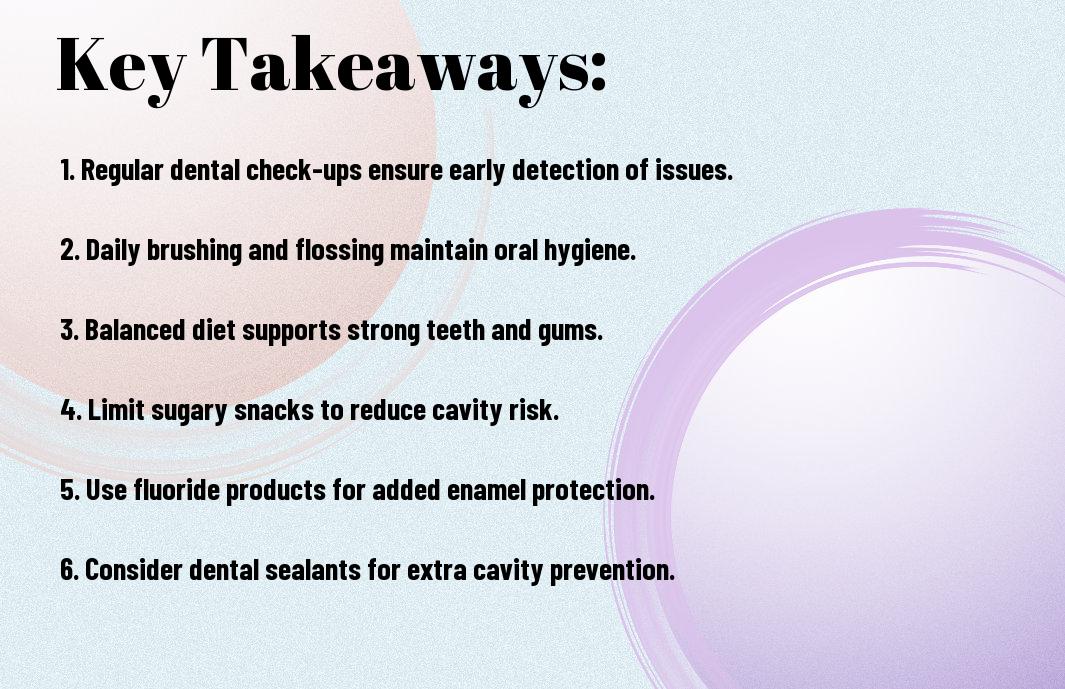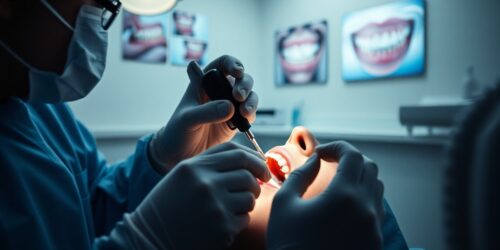Preventive Dentistry – 5 Steps To Keep Your Teeth Healthy For Life
With the right preventive measures, you can maintain your oral health and avoid painful, costly dental issues in the future. I’m here to share five imperative steps that you can implement today to keep your teeth strong and healthy throughout your life. By prioritizing your dental care routine, you can not only enhance your smile but also boost your overall health. Read on to discover how simple habits can make a significant difference in your dental well-being.

Key Takeaways:
- Regular Check-ups: Schedule dental visits every six months to catch issues early.
- Proper Brushing: Brush teeth at least twice a day using fluoride toothpaste for effective plaque removal.
- Floss Daily: Incorporate flossing into your routine to clean between teeth and prevent gum disease.
- Healthy Diet: Consume a balanced diet rich in vitamins and minerals while limiting sugary snacks and drinks.
- Fluoride Treatments: Consider fluoride treatments to strengthen enamel and protect against cavities.
- Mouthguards: Use mouthguards during sports or grinding to prevent damage to teeth.
- Teeth Whitening: Engage in professional whitening options for cosmetic enhancement, but ensure dental health is prioritized first.
Understanding Preventive Dentistry
To maintain a healthy smile, it is necessary to understand the concept of preventive dentistry. This field focuses on the proactive measures one can take to prevent dental issues before they arise. By prioritizing preventive care, you not only conserve your oral health but also potentially save significant financial resources, as untreated dental problems can lead to costly procedures down the line. For a more in-depth discussion on this topic, I recommend checking out Preventive Dentistry: How to Keep Your Teeth Healthy and …. Learning about and implementing preventive strategies can make a significant difference in the longevity of your dental health.
Definition and Importance
About preventive dentistry; it encompasses a variety of practices aimed at reducing the possibility of dental diseases. This includes routine check-ups, cleanings, and patient education on maintaining good oral hygiene. The importance of preventive dentistry cannot be overstated. By investing time and effort into these practices, you can enhance not only your oral health but also your overall quality of life. Better dental health contributes to improved self-esteem, reduced risk of systemic diseases, and can even play a role in your social interactions.
Common Dental Issues
To fully appreciate the role of preventive dentistry, it helps to recognize the common dental issues that many people face. Conditions such as tooth decay, gum disease, and oral cancer are prevalent and can lead to serious complications if left untreated. Regular dental check-ups play a vital role in identifying early signs of these issues, allowing for more straightforward and less invasive treatments. Furthermore, staying informed about potential risks, such as the impact of dietary choices and oral hygiene habits, is imperative in taking charge of your dental health.
Indeed, common dental issues like tooth decay and gum disease can have long-lasting effects if not addressed promptly. Tooth decay occurs when plaque, a sticky film of bacteria, forms on your teeth and produces acids that erode enamel. If untreated, it can lead to severe pain, infections, and tooth loss. Similarly, gum disease can cause inflammation, bleeding, and even tooth loss if left unchecked. By practicing preventive dentistry, you have the opportunity to dispel these problems before they escalate, ultimately leading to a healthier and more vibrant smile.

Daily Oral Hygiene Practices
One of the most important aspects of preventive dentistry is maintaining a consistent routine of daily oral hygiene practices. This involves not just brushing your teeth but also incorporating flossing and rinsing into your regimen. By dedicating time to these simple yet effective practices, you are taking significant steps toward ensuring that your teeth remain healthy for life. It’s vital that you commit to this routine, as it can greatly influence your oral health and help avoid the unpleasant consequences of neglect, such as cavities and gum disease.
Brushing Techniques
Before you commence on your daily brushing routine, it’s crucial to understand the right techniques to maximize your effort. Firstly, use a soft-bristled toothbrush and fluoride toothpaste. Angling the brush at about 45 degrees against your gums, gently move the brush back and forth in short (tooth-wide) strokes. Make sure to cover all surfaces of the teeth including the outer, inner, and chewing surfaces while also giving extra attention to the back teeth where plaque tends to accumulate. Aim for a brushing duration of at least two minutes, and don’t forget to brush your tongue as well, as it can harbor bacteria. If you have questions about your brushing technique, consider discussing them with your dentist during your next visit.
Flossing and Rinsing
By incorporating flossing into your daily routine, you can significantly reduce the risk of developing gum disease and cavities. Flossing removes plaque and food particles from between your teeth and under the gumline, areas that a toothbrush simply cannot reach. Ensure you use about 18 inches of dental floss, wrapping the ends around your fingers and gently sliding the floss between your teeth in a C-shaped motion. It’s a good practice to floss before you brush your teeth, as this clears out the debris that brushing can miss.
For instance, if you are diligent about flossing along with rinsing your mouth with an antibacterial mouthwash, you actively combat bad breath and support the overall health of your gums. By utilizing these two practices alongside brushing, you are significantly enhancing your oral health routine. A well-rounded approach helps ensure that even the most stubborn plaque does not accumulate in hard-to-reach pockets, ultimately leading to healthier teeth and gums for years to come.
Regular Dental Check-Ups
After establishing a daily oral hygiene routine, the next vital step in preventive dentistry is scheduling regular dental check-ups. These visits are important for identifying any potential issues before they escalate. I recommend visiting your dentist at least twice a year, but depending on your personal oral health needs, your dentist may suggest more frequent visits. Regular check-ups help to ensure not only the health of your teeth but also your gums and overall oral health, acting as an early warning system for decay or periodontal disease.
Frequency and Importance
Behind the regular dental check-up lies the importance of monitoring your oral health consistently. These appointments allow your dentist to conduct a thorough examination of your mouth, helping catch any signs of problems you might not notice yourself. Some conditions, such as gum disease and cavities, can develop slowly and may not present any symptoms until they become serious. Consistent check-ups help to prevent these issues, giving you peace of mind and a healthier smile.
What to Expect During an Appointment
At each dental appointment, you can expect a comprehensive examination, including X-rays if necessary. Your dentist will check for cavities, gum disease, and other oral health concerns. In addition to the exam, a professional cleaning will remove plaque and tartar buildup, which can’t be addressed through regular brushing alone. It’s a chance to address any questions or concerns you might have about your oral health or hygiene practices.
Considering these appointments provides an opportunity for preventive care, it’s vital to be informed about what happens during your visit. You’ll undergo diagnostic procedures that will help identify any potential issues early on. The cleaning process will help remove any stubborn deposits, reducing your risk of developing more severe problems down the line. The partnership with your dentist can make a significant difference in maintaining your oral health, allowing for a positive and proactive approach rather than reactive treatment when issues arise.
Nutritional Choices for Dental Health
Despite common beliefs, maintaining dental health goes beyond regular brushing and flossing. The food choices I make every day play a significant role in keeping my teeth strong and healthy. A balanced diet not only nourishes my body but also helps protect my enamel and prevent cavities. By focusing on certain foods, I can support my oral health effectively while enjoying a variety of delicious options.
Foods to Embrace
Choices that promote dental health include crunchy fruits and vegetables such as apples, carrots, and celery. These foods can help remove plaque and stimulate saliva production, which is crucial for neutralizing acids in the mouth. Additionally, incorporating dairy products like yogurt and cheese into my diet provides important calcium and phosphate, which are vital for strengthening tooth enamel. Lean proteins and whole grains also play a beneficial role by supplying the necessary nutrients that support overall health, including oral health.
Foods to Avoid
Beside embracing healthy foods, it is equally important to recognize what to limit in my diet to maintain optimal dental health. I should steer clear of sugary snacks and beverages, as these not only promote the growth of harmful bacteria in the mouth but can also lead to the formation of cavities. Additionally, acidic foods like citrus fruits and soda can erode tooth enamel, making my teeth more susceptible to decay.
In addition to sugary and acidic foods, I should be cautious about consuming sticky snacks such as dried fruit or gummy candies. These can adhere to my teeth and provide a constant food source for bacteria, increasing the risk of cavities. Choosing healthier alternatives and maintaining a balanced diet will not only promote my overall health but also contribute to lasting dental wellness.
The Role of Fluoride
Now that we understand the significance of preventive dentistry, let’s talk about fluoride and how it plays a vital role in maintaining your oral health. Fluoride is a naturally occurring mineral that can help protect your teeth from decay. When I emphasize the importance of fluoride, I refer to it as one of the most effective tools in promoting a Healthy Smile for Life: Preventive Dentistry Tips. By incorporating fluoride into your oral hygiene routine, you can substantially reduce the risk of cavities and enhance the overall strength of your teeth.
Benefits of Fluoride
Behind the scenes, fluoride strengthens the tooth enamel, making it more resistant to the acids produced by bacteria in the mouth. This function not only helps to reverse the early stages of tooth decay but also aids in the remineralization process. By using fluoride toothpaste or receiving professional fluoride treatments from your dentist, you significantly lower your chances of developing cavities. Additionally, studies have shown that communities with water fluoridation have lower rates of tooth decay among their residents, underscoring fluoride’s effectiveness.
Fluoride Sources
Fluoride is a versatile element that can be sourced through various means. Common sources include fluoridated drinking water, toothpaste, and mouth rinses specifically designed to fight cavities. You might also find fluoride treatments available at your dentist’s office. While it is important to have fluoride in your dental care routine, it is advisable to use it in appropriate amounts. Excessive fluoride, especially in young children, can lead to dental fluorosis, a condition that affects the appearance of teeth.
Understanding where to source fluoride can empower you in your quest for optimal dental health. The most accessible source is usually fluoridated tap water, which many municipalities provide. Additionally, several brands of toothpaste contain varying fluoride concentrations, so choosing one that suits your needs is important. Professional fluoride treatments, administered by your dentist, can offer a concentrated dose, further strengthening your teeth. By integrating these fluoride sources into your routine, you ensure that your teeth receive the support they need to stay healthy.

Protecting Your Teeth During Sports
Many athletes overlook the importance of protecting their teeth while participating in sports. From football to basketball, injuries can happen at any time, which is why it’s vital to take proactive measures to safeguard your dental health. You might not realize it, but a simple fall or a stray ball can lead to serious dental injuries that can have long-lasting effects on your oral health. Protecting your teeth during sports should not be an afterthought; it should be at the forefront of your safety gear.
Importance of Mouthguards
Any athlete knows the adrenaline rush that comes with competing, but that excitement must be balanced with safety. That’s where mouthguards come into play. These protective devices act as a barrier between your teeth and any potential impact, reducing the likelihood of broken teeth, jaw injuries, or other dental trauma. For anyone participating in contact sports, wearing a mouthguard is necessary for maintaining both oral health and overall confidence on the field or court.
| Benefits of Mouthguards | Description |
| Reduces Risk of Injury | Minimizes dental trauma and protects your teeth during collisions. |
| Enhances Performance | Allows you to focus on the game instead of worrying about potential injuries. |
| Custom-fit options | Custom mouthguards provide better comfort and protection compared to boil-and-bite models. |
| Protects Soft Tissues | Helps in reducing damage to gums, cheeks, and lips during impact. |
| Long-term Dental Health | A solid preventive measure can save you from future dental issues and expenses. |
Types of Mouthguards
Protecting your smile comes in various forms. There are generally three types of mouthguards: store-bought or “boil-and-bite” mouthguards, custom-fitted mouthguards from your dentist, and those specifically designed for braces. Store-bought options are convenient but may not offer the best fit or protection. On the other hand, custom mouthguards provide a personalized fit that can be much more comfortable for long wear during sporting activities. If you wear braces, it’s even more important to choose the right mouthguard to avoid damaging your dental appliances.
| Type of Mouthguard | Description |
| Boil-and-Bite | Available in most sports stores; you boil it to soften, then bite to shape. |
| Custom-Fitted | Made by a dentist for optimum protection and comfort tailored to your mouth. |
| Mouthguards for Braces | Specially designed to accommodate fixed dental appliances without hindrance. |
| Multi-Sport Mouthguards | Versatile designs that can be used across various sports for protection. |
| Heat-Activated Mouthguards | Conforms to teeth when heated, allowing for a more customized fit. |
Considering the different types of mouthguards, it’s important to choose the one that best fits your needs and the type of sport you engage in. Each mouthguard type serves a specific purpose and offers varying levels of protection and comfort. If you engage in high-contact sports, investing in a custom-fitted mouthguard can be one of the best decisions you make for your long-term dental health. Make sure to discuss your options with a dental professional to ensure you select the best guard for your situation.
- Be proactive about your dental safety
- Choose a suitable mouthguard based on your sport
- Explore custom options for more protection
- Mouthguards can prevent serious dental injuries
- Consult a dentist to tailor your choice
Knowing the importance and types of mouthguards can be vital in your sports journey. Your smile deserves as much attention during practice and games as your performance!
Summing up
Summing up, I believe that incorporating effective preventive dentistry practices into your daily routine is important for maintaining healthy teeth and gums throughout your life. By taking proactive steps, such as brushing and flossing regularly, visiting your dentist for routine check-ups, and adopting a balanced diet, you can significantly reduce the risk of dental issues and ensure your smile remains bright and strong. More importantly, these habits not only benefit your oral health but also contribute positively to your overall well-being.
As I reflect on the 5 steps to keeping your teeth healthy for life, I recognize that consistency is key. You have the power to influence your dental health through simple yet impactful choices made each day. By prioritizing preventive dentistry, you are investing in a future where your teeth and gums are resilient, allowing you to enjoy life’s moments with confidence. Ultimately, I am committed to supporting you on this journey to achieving and maintaining optimal oral health.
FAQ
Q: What is preventive dentistry?
A: Preventive dentistry focuses on maintaining oral health to prevent dental issues before they occur. It includes practices such as regular dental check-ups, good oral hygiene habits, and preventive care treatments. The goal is to keep teeth and gums healthy and reduce the risk of cavities, gum disease, and other dental problems.
Q: How often should I visit the dentist for preventive care?
A: It is typically recommended to visit the dentist twice a year for regular cleanings and check-ups. However, some individuals may need to see the dentist more often, depending on their oral health needs and risk factors. Your dentist will provide personalized recommendations based on your situation.
Q: What role does brushing play in preventive dentistry?
A: Brushing is a fundamental part of preventive dentistry. Regular brushing helps remove plaque, which is a sticky film of bacteria that can lead to cavities and gum disease if not removed. It is advised to brush at least twice a day with fluoride toothpaste and to use proper techniques to ensure effective cleaning.
Q: Why is flossing important for dental health?
A: Flossing helps clean areas between teeth that a toothbrush may not reach. This practice can remove food particles and plaque, which reduces the risk of gum disease and cavities. Flossing daily is recommended as an imperative component of a complete oral hygiene routine.
Q: Are there specific dietary recommendations to support dental health?
A: Yes, a balanced diet supports dental health. Consuming foods high in calcium, vitamins C and D, and fiber can benefit teeth and gums. Limiting sugary snacks and beverages helps prevent cavities, as sugar feeds bacteria in the mouth. Staying hydrated by drinking water, particularly fluoridated water, is also beneficial for oral health.
Q: What preventive treatments can my dentist provide?
A: Dentists offer various preventive treatments, including dental sealants, fluoride treatments, and mouth guards. Dental sealants protect the chewing surfaces of teeth from cavities, while fluoride treatments strengthen enamel. Mouth guards are beneficial for individuals involved in sports or those who grind their teeth at night.
Q: How can I maintain good oral hygiene at home?
A: To maintain good oral hygiene at home, brush your teeth at least twice daily with fluoride toothpaste, floss daily, and use an antibacterial mouthwash if recommended. Additionally, clean your toothbrush regularly, replace it every three to four months, and cultivate healthy eating habits. These practices collectively contribute to long-lasting oral health.






